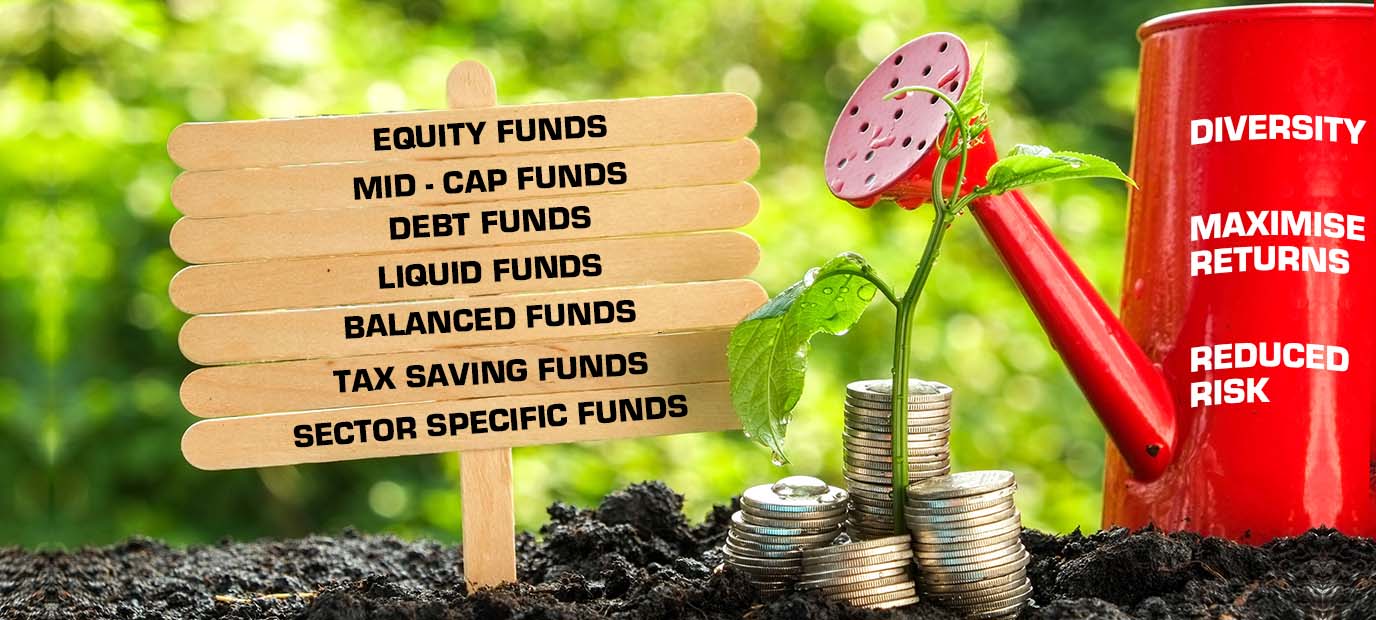An open-end fund is a mutual fund scheme that is available for subscription and redemption on every business throughout the year, (akin to a savings bank account, wherein one may deposit and withdraw money every day). An open-ended scheme is perpetual and does not have any maturity date.
Fund Manager Interview
MF News
REGISTER
PRODUCTS
The mutual fund industry of India is continuously evolving. Along the way, several industry bodies are also investing towards investor education. Yet, according to a report by Boston Analytics, less than 10% of our households consider mutual funds as an investment avenue. It is still considered as a high-risk option. In fact, a basic inquiry about the types of mutual funds reveals that these are perhaps one of the most flexible, comprehensive and hassle free modes of investments that can accommodate various types of investor needs. Various types of mutual funds categories are designed to allow investors to choose a scheme based on the risk they are willing to take, the investable amount, their goals, the investment term, etc. Let us have a look at some important mutual fund schemes under the following three categories based on maturity period of investment:
A closed-end fund is open for subscription only during the initial offer period and has a specified tenor and fixed maturity date (akin to a fixed term deposit). Units of Closed-end funds can be redeemed only on maturity (i.e., pre-mature redemption is not permitted). Hence, the Units of a closed-end fund are compulsorily listed on a stock exchange after the new fund offer and are traded on the stock exchange just like other stocks, so that investors seeking to exit the scheme before maturity may sell their Units on the exchange.
An equity fund is a mutual fund scheme that invests predominantly in equity stocks.
In the Indian context, as per current SEBI Mutual Fund Regulations, an equity mutual fund scheme must invest at least 65% of the scheme’s assets in equities and equity related instruments.
Under the tax regime in India, equity funds enjoy certain tax advantages (such as, there is no incidence of long-term capital gains tax on equity shares or equity funds which are held for at least 12 months from the date of acquisition). As per current Income Tax rules, an "Equity Oriented Fund" means a Mutual Fund Scheme where the investible funds are invested in equity shares in domestic companies to the extent of more than 65% of the total proceeds of such fund.
An Equity Fund can be actively managed or passively managed. Index funds and ETFs are passively managed.
Equity mutual funds are principally categorized according to company size, the investment style of the holdings in the portfolio and geography.
The sizes of an equity fund is determined by a market capitalization, while the investment style, reflected in the fund's stock holdings, is also used to categorize equity mutual funds.
Equity funds are also categorized by whether they are domestic (investing in stocks of only Indian companies) or international (investing in stocks of overseas companies). These can be broad market, regional or single-country funds.
Some specialty equity funds target business sectors, such as health care, commodities, and real estate and are known as Sectoral Funds.
A debt fund is a mutual fund scheme that invests in fixed income instruments, such as Corporate and Government Bonds, corporate debt securities, and money market instruments etc. that offer capital appreciation. Debt funds are also referred to as Income Funds or Bond Funds.
Liquid Funds, as the name suggests, invest predominantly in highly liquid money market instruments and debt securities of very short tenure and hence provide high liquidity. They invest in very short-term instruments such as Treasury Bills (T-bills), Commercial Paper (CP), Certificates Of Deposit (CD) and Collateralized Lending & Borrowing Obligations (CBLO) that have residual maturities of up to 91 days to generate optimal returns while maintaining safety and high liquidity. Redemption requests in these Liquid funds are processed within one working (T+1) day.
A balanced fund combines equity stock component, a bond component and sometimes a money market component in a single portfolio. Generally, these hybrid funds stick to a relatively fixed mix of stocks and bonds that reflects either a moderate, or higher equity, component, or conservative, or higher fixed-income, component orientation These funds invest in a mix of equities and debt, giving the investor the best of both worlds. Balanced funds gain from a healthy dose of equities but the debt portion fortifies them against any downturn.


